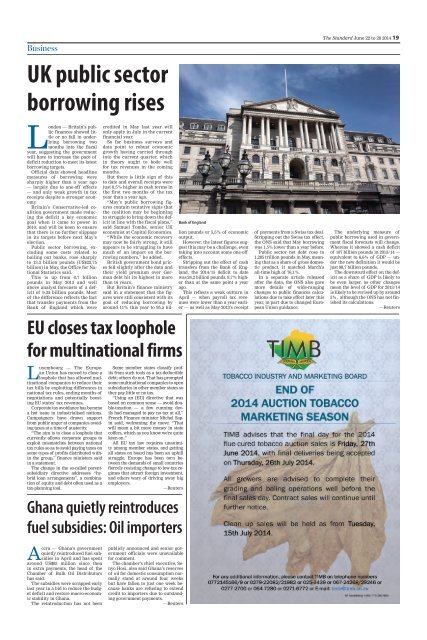The Standard 22 June 2014
You also want an ePaper? Increase the reach of your titles
YUMPU automatically turns print PDFs into web optimized ePapers that Google loves.
Business<br />
<strong>The</strong> <strong>Standard</strong> <strong>June</strong> <strong>22</strong> to 28 <strong>2014</strong> 19<br />
UK public sector<br />
borrowing rises<br />
London — Britain’s public<br />
finances showed little<br />
or no fall in underlying<br />
borrowing two<br />
months into the fiscal<br />
year, suggesting the government<br />
will have to increase the pace of<br />
deficit reduction to meet its latest<br />
borrowing targets.<br />
Official data showed headline<br />
measures of borrowing were<br />
sharply higher than a year ago<br />
— largely due to one-off effects<br />
— and only weak growth in tax<br />
receipts despite a stronger economy.<br />
Britain’s Conservative-led coalition<br />
government made reducing<br />
the deficit a key economic<br />
goal when it came to power in<br />
2010, and will be keen to ensure<br />
that there is no further slippage<br />
in its targets before next May’s<br />
election.<br />
Public sector borrowing, excluding<br />
some costs related to<br />
bailing out banks, rose sharply<br />
to 13,3 billion pounds (US$<strong>22</strong>,75<br />
billion) in May, the Office for National<br />
Statistics said.<br />
This is up from 8,7 billion<br />
pounds in May 2013 and well<br />
above analyst forecasts of a deficit<br />
of 9,35 billion pounds. Most<br />
of the difference reflects the fact<br />
that transfer payments from the<br />
Bank of England which were<br />
Bank of England<br />
credited in May last year will<br />
only apply in July in the current<br />
financial year.<br />
So far business surveys and<br />
data point to robust economic<br />
growth having carried through<br />
into the current quarter, which<br />
in theory ought to bode well<br />
for tax revenues in the coming<br />
months.<br />
But there is little sign of this<br />
to date and overall receipts were<br />
just 0,5% higher in cash terms in<br />
the first two months of the tax<br />
year than a year ago.<br />
“May’s public borrowing figures<br />
contain tentative signs that<br />
the coalition may be beginning<br />
to struggle to bring down the deficit<br />
in line with the fiscal plans,”<br />
said Samuel Tombs, senior UK<br />
economist at Capital Economics.<br />
“While the economic recovery<br />
may now be fairly strong, it still<br />
appears to be struggling to have<br />
much of an impact on the borrowing<br />
numbers,” he added.<br />
British government bond prices<br />
fell slightly after the data and<br />
their yield premium over German<br />
debt hit its highest in more<br />
than 16 years.<br />
But Britain’s finance ministry<br />
said in a statement that the figures<br />
were still consistent with its<br />
goal of reducing borrowing by<br />
around 11% this year to 95,5 billion<br />
pounds or 5,5% of economic<br />
output.<br />
However, the latest figures suggest<br />
this may be a challenge, even<br />
taking into account some one-off<br />
effects.<br />
Stripping out the effect of cash<br />
transfers from the Bank of England,<br />
the <strong>2014</strong>/15 deficit to date<br />
was 24,2 billion pounds, 8,7% higher<br />
than at the same point a year<br />
ago.<br />
This reflects a weak outturn in<br />
April — when payroll tax revenues<br />
were lower than a year earlier<br />
— as well as May 2013’s receipt<br />
of payments from a Swiss tax deal.<br />
Stripping out the Swiss tax effect,<br />
the ONS said that May borrowing<br />
was 1,5% lower than a year before.<br />
Public sector net debt rose to<br />
1,285 trillion pounds in May, meaning<br />
that as a share of gross domestic<br />
product, it matched March’s<br />
all-time high of 76,1%.<br />
In a separate article released<br />
after the data, the ONS also gave<br />
more details of wide-ranging<br />
changes to public finances calculations<br />
due to take effect later this<br />
year, in part due to changed European<br />
Union guidance.<br />
<strong>The</strong> underlying measure of<br />
public borrowing used in government<br />
fiscal forecasts will change.<br />
Whereas it showed a cash deficit<br />
of 107 billion pounds in 2013/14 —<br />
equivalent to 6,6% of GDP — under<br />
the new definition it would be<br />
just 98,7 billion pounds.<br />
<strong>The</strong> downward effect on the deficit<br />
as a share of GDP is likely to<br />
be even larger, as other changes<br />
mean the level of GDP for 2013/14<br />
is likely to be revised up by around<br />
5%, although the ONS has not finished<br />
its calculations.<br />
—Reuters<br />
EU closes tax loophole<br />
for multinational firms<br />
Luxembourg — <strong>The</strong> European<br />
Union has moved to close a<br />
loophole that has allowed multinational<br />
companies to reduce their<br />
tax bills by exploiting differences in<br />
national tax rules, ending months of<br />
negotiations and potentially boosting<br />
EU states’ tax revenues.<br />
Corporate tax avoidance has become<br />
a hot issue in industrialised nations.<br />
Campaigners have drawn support<br />
from public anger at companies avoiding<br />
taxes at a time of austerity.<br />
“<strong>The</strong> aim is to close a loophole that<br />
currently allows corporate groups to<br />
exploit mismatches between national<br />
tax rules so as to avoid paying taxes on<br />
some types of profits distributed within<br />
the group,” finance ministers said<br />
in a statement.<br />
<strong>The</strong> change in the so-called parentsubsidiary<br />
directive addresses “hybrid<br />
loan arrangements”, a combination<br />
of equity and debt often used as a<br />
tax-planning tool.<br />
Some member states classify profits<br />
from such tools as a tax-deductible<br />
debt; others do not. That has prompted<br />
some multinational companies to open<br />
subsidiaries in other member states so<br />
they pay little or no tax.<br />
“Using an [EU] directive that was<br />
based on common sense — avoid double-taxation<br />
— a few cunning devils<br />
had managed to pay no tax at all,”<br />
French Finance minister Michel Sapin<br />
said, welcoming the move. “That<br />
will mean a bit more money in state<br />
coffers, which as you know we're quite<br />
keen on.”<br />
All EU tax law requires unanimity<br />
among member states, and getting<br />
all states on board has been an uphill<br />
struggle. Europe has been torn between<br />
the demands of small countries<br />
fiercely resisting change to low-tax regimes<br />
that attract foreign investment,<br />
and others wary of driving away big<br />
employers.<br />
—Reuters<br />
Ghana quietly reintroduces<br />
fuel subsidies: Oil importers<br />
Accra — Ghana’s government<br />
quietly reintroduced fuel subsidies<br />
in April and has spent<br />
around US$85 million since then<br />
in extra payments, the head of the<br />
Chamber of Bulk Oil Distributors<br />
has said.<br />
<strong>The</strong> subsidies were scrapped early<br />
last year in a bid to reduce the budget<br />
deficit and restore macro-economic<br />
stability in Ghana.<br />
<strong>The</strong> reintroduction has not been<br />
publicly announced and senior government<br />
officials were unavailable<br />
for comment.<br />
<strong>The</strong> chamber’s chief executive, Senyo<br />
Hosi, also said Ghana’s reserves<br />
of oil for domestic consumption normally<br />
stand at around four weeks<br />
but have fallen to just one week because<br />
banks are refusing to extend<br />
credit to importers due to outstanding<br />
government payments.<br />
—Reuters


















